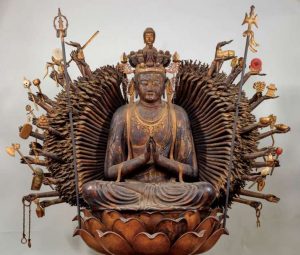Many believe that happiness is elusive. We have a habit of running towards it, of believing happiness is only in the future. But all the conditions of happiness are right here for us to create, Zen Master Thich Nhat Hanh told a crowd of 8000 in Hong Kong last week.
Thay, the Vietnamese word for teacher, as he is fondly known, explained that happiness is not driven by fortune, power, or sex. Many who have those things in fact suffer very deeply, such as some businessmen, who think too much about the future and have forgotten about the present moment.
To be happy, we must simply be insightful to the fact that all the miracles of life are already available.
“To me, to be alive is a miracle – the greatest of all miracles,” Thay says. We can touch that miracle, celebrate life by living a moment deeply and getting our minds back to our body. “We can reach this happiness, step into the pure land,” Thay says with a smile.
Mindfulness lies at the center of Thay’s teachings. Mindful breathing can help the mind get back to the body, helping us live the moment more deeply. If our mindfulness and concentration are powerful enough: one breath is already enough to make us free, to recognize that we are alive, Thay says.
Daily life carries so many distractions, Thay says, when our bodies are here but our minds elsewhere – the mind can be entrenched in sorrow, regret, fear and uncertainty. To be aware, for the body and the mind to be at home in the present moment: that is how we recognize all the happiness of the present.
Everything can be done mindfully. When love arises, Thay gave as an example, we should be mindful and aware that we are loving.
When you love someone, Thay continues, the most precious gift you can give them is your presence: to be there for them, to be fully present for them in the here and the now. He suggested a mantra to say to our loved ones: “Darling, I am here for you.” If you cannot tell them that in person, you can even send them an email, Thay says, which can bring them immediate joy.
We must also recognize the presence and love of the one that loves us. “Darling, I know you are there and that makes me so happy,” Thay suggests as a mantra.
It is important, also, to be there for your loved one in a time of need, and be mindful that something is bothering him or her. “Darling, I know you suffer, and that is why I am here for you.” If you ignore their suffering, they suffer more. But if you are there for them, Thay says, they suffer less right away.
Suffering and happiness are intertwined, Thay explained, and the absence of suffering can be nothing else but happiness. And so, the cessation of suffering must be the beginning of happiness, Thay says, much like there is light in the absence of darkness. A moment of happiness can become possible even if there is still suffering, Thay furthers, and there is no need to remove suffering in order to be happy.
Like a good gardener who can see the lotus flower by looking at the mud, Thay says, a true practitioner realizes that it is suffering that nurtures happiness.
Thay also taught the crowd pebble meditation: a practice that can make our presence more refreshing. Children who visit Plum Village every year love this simple, wonderful meditation, he says. After finding four pebbles, we look at each of the pebbles mindfully for a while then call the pebbles by its true names.
The first pebble is a flower – fresh and beautiful. Every one of us is a flower in the garden of humanity, Thay says, but many do not know how to maintain that freshness. We allow anger and fear to affect us, making us not as beautiful as before. We have cried too much, and our eyes are not as dewy. By calling to the flower, it helps us restore the freshness, smiling to bring back the flower-ness to our bodies.
The second pebble is a mountain, for solidarity. “If you are not stable, how can others count on you?” Thay asks.
The third is still water, reflecting things that are peaceful and tranquil. The lake can help calm down our body. Most of our sufferings stem from having a wrong perception – when we are angry and fearful, we no longer trust. We need to restore that image of truth to avoid making mistakes.
The final pebble represents space and freedom. If you love someone, you must give them the freedom to be him or herself. Space is freedom, Thay explains, and true happiness does not happen without freedom in your heart and around you. Even if you are full of ideas of your own, you must have space to be capable of listening to others. If we only impose our way and ideas on others, without any space in our heart, we have nothing to offer loved ones.
The Buddha,” Thay adds, is a very happy person who has lots of freedom – free of views, anger or jealousy.
Freedom is the ground of his happiness.















